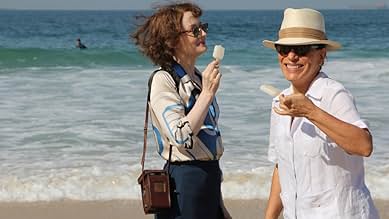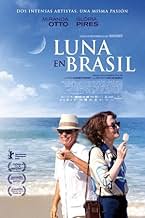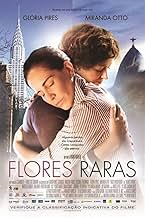IMDb RATING
7.0/10
3.7K
YOUR RATING
A chronicle of the tragic love affair between American poet Elizabeth Bishop and Brazilian architect Lota de Macedo Soares.A chronicle of the tragic love affair between American poet Elizabeth Bishop and Brazilian architect Lota de Macedo Soares.A chronicle of the tragic love affair between American poet Elizabeth Bishop and Brazilian architect Lota de Macedo Soares.
- Awards
- 9 wins & 21 nominations total
Featured reviews
This is a beautifully filmed movie about the lives of two exceptional women whose lives collided in the early 50s and went on for 17 years. Oh - it's a true story, BTW.
The locations are spectacular in a quiet way and worth the watch on their own. They added one star.
I am ashamed to say I was not aware of Elizabeth Bishop. Now I am looking forward to reading her material.
Hope you enjoy this film.
The locations are spectacular in a quiet way and worth the watch on their own. They added one star.
I am ashamed to say I was not aware of Elizabeth Bishop. Now I am looking forward to reading her material.
Hope you enjoy this film.
Lovely. A story here that is not overshadowed by the relationships, politics, or agenda. It is, simply beautifully filmed, the beaches of Rio De Janeiro, the beautiful home Lota has deigned in part to accommodate her new lover, poet Elizabeth Bishop, completely played by Miranda Otto.
Otto is at once restrained yet yearning, a Vassar graduate visiting her friend, who initially is puzzled (and indeed overwhelmed) by the beauty and passion of South America.
She plays the American New England spinster type well, without a stereotype here. We can feel she wants, and NEEDS to break free from societal restraints.
The filming of the rain forests, the owls at night, the visuals are incredible. Lota Soares was politically connected and designed the park near Carioca beach, the title infers, reaching for the moon has so may more connotations for each woman.
What is most refreshing is the way this film is written, sensitive to the issues each woman experiences, it is an individual and a private journey.
The actress portraying Carlotta Soares is affecting and sad, and Miranda Otto is quite believable as Bishop. The story is beautiful and sad, and the scenery of Brazil is not to be missed, simply beautiful, and beautifully filmed. 10/10
Otto is at once restrained yet yearning, a Vassar graduate visiting her friend, who initially is puzzled (and indeed overwhelmed) by the beauty and passion of South America.
She plays the American New England spinster type well, without a stereotype here. We can feel she wants, and NEEDS to break free from societal restraints.
The filming of the rain forests, the owls at night, the visuals are incredible. Lota Soares was politically connected and designed the park near Carioca beach, the title infers, reaching for the moon has so may more connotations for each woman.
What is most refreshing is the way this film is written, sensitive to the issues each woman experiences, it is an individual and a private journey.
The actress portraying Carlotta Soares is affecting and sad, and Miranda Otto is quite believable as Bishop. The story is beautiful and sad, and the scenery of Brazil is not to be missed, simply beautiful, and beautifully filmed. 10/10
After the famous poet, Elizabeth Bishop, is greatly mentored by the star poet Robert Lowell, she, travels to Brazil, on her inheritance, has a love affair with a wealthy, female architect, who is in another love relationship with a former fellow student of Bishop's at Vassar College, called Mary. This threesome love relationship fails because each person involved in this relationship has a main flaw. Bishop's flaw is alcoholism. The architect's flaw is that she works herself to the point of mental insanity. Mary's flaw is jealousy. She does not want to share her architect girlfriend with Elizabeth Bishop, understandably.
When watching the film in the cinema, yesterday, with the oranges and the red wine, I bought at the booth, all of us clapped at the end of the film, with wonderful actors, very beautiful scenery of Brazil as well as fantastic architecture, before tortillas, guacamole, nachos, corona and other Latin American snacks that were cheaply sold outside.
This positive account begs the question, why I did not rate that film to be so good. Like many art-house or like many artsy films, Reaching for the Moon, we hardly know who most of the characters in this film truly are. There is just not enough character development in the film. We do not know what exactly makes Miss Bishop travel, why she loves this architect, why the architect loves her and why Mary loves this architect. We also do not know their views about belonging to a sexual minority. We do not know the reason for their flaws, such as the traumatic experiences that made Miss Bishop an alcoholic, what made the architect a workaholic, who does not talk to her family, and we know almost nothing about this third girl Mary, except that she went to University with Miss Bishop.
We do not know the exact cause or even the nature of the architect's insanity. When she kills herself, she leaves no note, and nobody even asks or tries to find out why the hell she did it or if it was an accident.
Like most films about poetry little attention is paid to the kind of Poetry Miss Bishop wrote, so that when she wins the National Book Award and the Pulitzer Prize, in the film, you still end up leaving the movie theatre wondering why her poetry was considered to be so special, apart from the fact that she was rich, well educated and knew some of the greatest poets like Robert Lowell and Marian Moore.
This film is full of paper Mache' characters, in which you hardly know who the people in the film are, despite the strong attempts of the actors in the film to act as well as possible, which made the film worth watching, especially as a poet and author myself, amongst other things.
When watching the film in the cinema, yesterday, with the oranges and the red wine, I bought at the booth, all of us clapped at the end of the film, with wonderful actors, very beautiful scenery of Brazil as well as fantastic architecture, before tortillas, guacamole, nachos, corona and other Latin American snacks that were cheaply sold outside.
This positive account begs the question, why I did not rate that film to be so good. Like many art-house or like many artsy films, Reaching for the Moon, we hardly know who most of the characters in this film truly are. There is just not enough character development in the film. We do not know what exactly makes Miss Bishop travel, why she loves this architect, why the architect loves her and why Mary loves this architect. We also do not know their views about belonging to a sexual minority. We do not know the reason for their flaws, such as the traumatic experiences that made Miss Bishop an alcoholic, what made the architect a workaholic, who does not talk to her family, and we know almost nothing about this third girl Mary, except that she went to University with Miss Bishop.
We do not know the exact cause or even the nature of the architect's insanity. When she kills herself, she leaves no note, and nobody even asks or tries to find out why the hell she did it or if it was an accident.
Like most films about poetry little attention is paid to the kind of Poetry Miss Bishop wrote, so that when she wins the National Book Award and the Pulitzer Prize, in the film, you still end up leaving the movie theatre wondering why her poetry was considered to be so special, apart from the fact that she was rich, well educated and knew some of the greatest poets like Robert Lowell and Marian Moore.
This film is full of paper Mache' characters, in which you hardly know who the people in the film are, despite the strong attempts of the actors in the film to act as well as possible, which made the film worth watching, especially as a poet and author myself, amongst other things.
Overall had a very good impression of the movie. I think it balanced well certain aspects... especially in the portrayal of their romance. They avoided being overly prudish and that made the romance seem more real. Without getting too kinky and losing focus. The contrast between the two characters is really interesting.
The actress Gloria Pires who portrays Lota de Macedo Soares has worked in dozens of soap operas and that sometimes comes through in her films, but not this time thankfully. She so embodies the force of nature that was Lota and this comes through the screen very well. I felt like I was seeing a member of my old Rio family... so her amazing portrayal was certainly the highlight of the film for me.
PS: Being a Macedo Soares myself (but too young to have known Lota)... there might be a bit of bias in my review.
The actress Gloria Pires who portrays Lota de Macedo Soares has worked in dozens of soap operas and that sometimes comes through in her films, but not this time thankfully. She so embodies the force of nature that was Lota and this comes through the screen very well. I felt like I was seeing a member of my old Rio family... so her amazing portrayal was certainly the highlight of the film for me.
PS: Being a Macedo Soares myself (but too young to have known Lota)... there might be a bit of bias in my review.
The Brazilian movie Flores Raras was shown in the United States with the title Reaching for the Moon (2013). It was directed by Bruno Barreto.
The film is based on the life of the great American poet, Elizabeth Bishop (Miranda Otto). As the movie begins, Elizabeth is traveling in Brazil, and visits the estate of the famous architect Lota de Macedo Soares, played by Glória Pires. Lota is in a lesbian relationship with Bishop's college friend Mary (Tracy Middendorf).
Despite Elizabeth's somewhat proper and restricted outlook, she accepts the love offered by Lota, even though this leaves Mary as the odd woman out. This act struck me as a shabby betrayal of an old friend, but, in the movie, it's treated as true love that makes such betrayal acceptable, if not inevitable.
It doesn't hurt that Lota has an enormous estate, and enormous resources. As an architect, Lota is able to envision and then design a beautiful writer's studio for Elizabeth.
The strong point of the movie is that it presents the writing of poetry as work. Elizabeth doesn't just close her eyes and wait until the poetic muse strikes her. She sits in the studio and pushes and pulls her poetry into shape. She's also not happy when she's interrupted during the creative process. This is the only film I can remember where creating a poem is shown as a process, and a delicate and difficult process at that.
This idyllic existence is disrupted by Brazilian political events, into which Lota plunges. The remainder of the movie is devoted to how these events play out in the lives of Elizabeth and Lota.
I don't know enough about the details of the coup, or of the lives of the film's principals, to know how accurately the film portrays them. This aspect of the movie is highly melodramatic, but the actual events were probably equally melodramatic. Certainly, the film holds your interest as the situation plays itself out to the end.
We saw this movie on the large screen, where it will work better, especially in the scenes set on Lota's estate. However, it will work well enough on the small screen. It's not a great movie, but it's certainly good enough to repay you for finding and watching it.
The film is based on the life of the great American poet, Elizabeth Bishop (Miranda Otto). As the movie begins, Elizabeth is traveling in Brazil, and visits the estate of the famous architect Lota de Macedo Soares, played by Glória Pires. Lota is in a lesbian relationship with Bishop's college friend Mary (Tracy Middendorf).
Despite Elizabeth's somewhat proper and restricted outlook, she accepts the love offered by Lota, even though this leaves Mary as the odd woman out. This act struck me as a shabby betrayal of an old friend, but, in the movie, it's treated as true love that makes such betrayal acceptable, if not inevitable.
It doesn't hurt that Lota has an enormous estate, and enormous resources. As an architect, Lota is able to envision and then design a beautiful writer's studio for Elizabeth.
The strong point of the movie is that it presents the writing of poetry as work. Elizabeth doesn't just close her eyes and wait until the poetic muse strikes her. She sits in the studio and pushes and pulls her poetry into shape. She's also not happy when she's interrupted during the creative process. This is the only film I can remember where creating a poem is shown as a process, and a delicate and difficult process at that.
This idyllic existence is disrupted by Brazilian political events, into which Lota plunges. The remainder of the movie is devoted to how these events play out in the lives of Elizabeth and Lota.
I don't know enough about the details of the coup, or of the lives of the film's principals, to know how accurately the film portrays them. This aspect of the movie is highly melodramatic, but the actual events were probably equally melodramatic. Certainly, the film holds your interest as the situation plays itself out to the end.
We saw this movie on the large screen, where it will work better, especially in the scenes set on Lota's estate. However, it will work well enough on the small screen. It's not a great movie, but it's certainly good enough to repay you for finding and watching it.
Did you know
- TriviaFour paragraphs appear between the end of the film and the beginning of the credits.
1. "Few women write major poetry. Only four stand with our best men: Emily Dickinson, Marianne Moore, Elizabeth Bishop and Sylvia Plath." - Robert Lowell
2. "I'd rather be called the 'The 16th Poet' with no reference to my sex, than one of 4 women - even if the other three are pretty good." - Elizabeth Bishop
3. Elizabeth Bishop died in 1979 in the United States. She is considered on the most important poets of the English language.
4. In 2012, UNESCO declared the city of Rio De Janeiro a World Heritage site. The Flamengo Park is one of its main attractions.
- GoofsOpening in 1951 but Bobby Vinton singing Blue Velvet was not until 1963.
- Quotes
Elizabeth Bishop: It's OK. I'm not drunk. I'm just crying in English.
- Crazy creditsNine of the main performers (the first 10) are listed in the credits without the name of their character. Only Treat Williams is credited as his character, Robert Lowell.
- ConnectionsReferenced in Programa do Jô: Episode dated 26 August 2013 (2013)
- How long is Reaching for the Moon?Powered by Alexa
Details
- Release date
- Country of origin
- Official sites
- Languages
- Also known as
- Fleurs rares
- Filming locations
- Production companies
- See more company credits at IMDbPro
Box office
- Gross US & Canada
- $45,502
- Opening weekend US & Canada
- $14,573
- Nov 10, 2013
- Gross worldwide
- $1,534,391
- Runtime1 hour 58 minutes
- Color
- Aspect ratio
- 1.85 : 1
Contribute to this page
Suggest an edit or add missing content



























